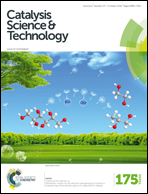Catalytic hydrotreatment of Alcell lignin fractions using a Ru/C catalyst†
Abstract
We here report the catalytic hydrotreatment of three different Alcell lignin fractions using a Ru/C catalyst in a batch reactor set-up (400 °C, 4 h, 100 bar H2 intake, 5 wt% catalyst on lignin). The fractions, obtained by a solvent fractionation scheme from Alcell lignin, differ in composition and molecular weight. The resulting product oils were characterized by various techniques, such as GC-MS-FID, GC × GC-FID, GPC, and 13C-NMR, to gain insight into the relationship between the feed and product yield/composition on a molecular level. The lowest molecular weight fraction (Mw = 660 g mol−1) gave the highest product oil yield after catalytic hydrotreatment (>70 wt% on lignin fraction). The main differences in molecular composition for the product oils were observed and are related to the chemical structure of the different feed fractions and less on the molecular weight. The highest amounts of valuable alkylphenolics (8.4 wt% on intake) and aromatic compounds (4.2 wt% on intake) in the product oils were obtained with the lowest molecular weight fraction. This fraction also contained the highest amounts of aliphatic hydrocarbons after the hydrotreatment reaction (14.0 wt% on intake), which were primarily linked to the presence of extractives in the Alcell lignin feed, that accumulate in this low molecular weight fraction during solvent fractionation.


 Please wait while we load your content...
Please wait while we load your content...